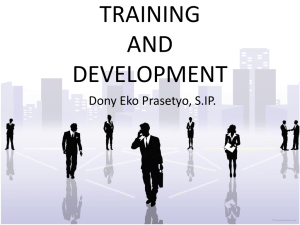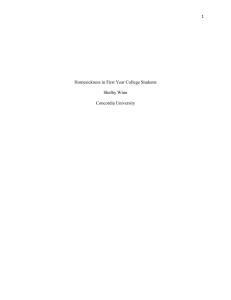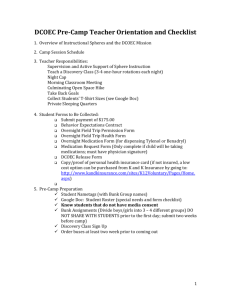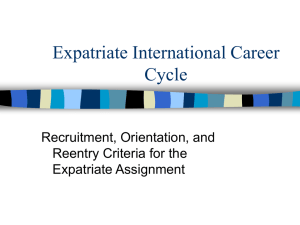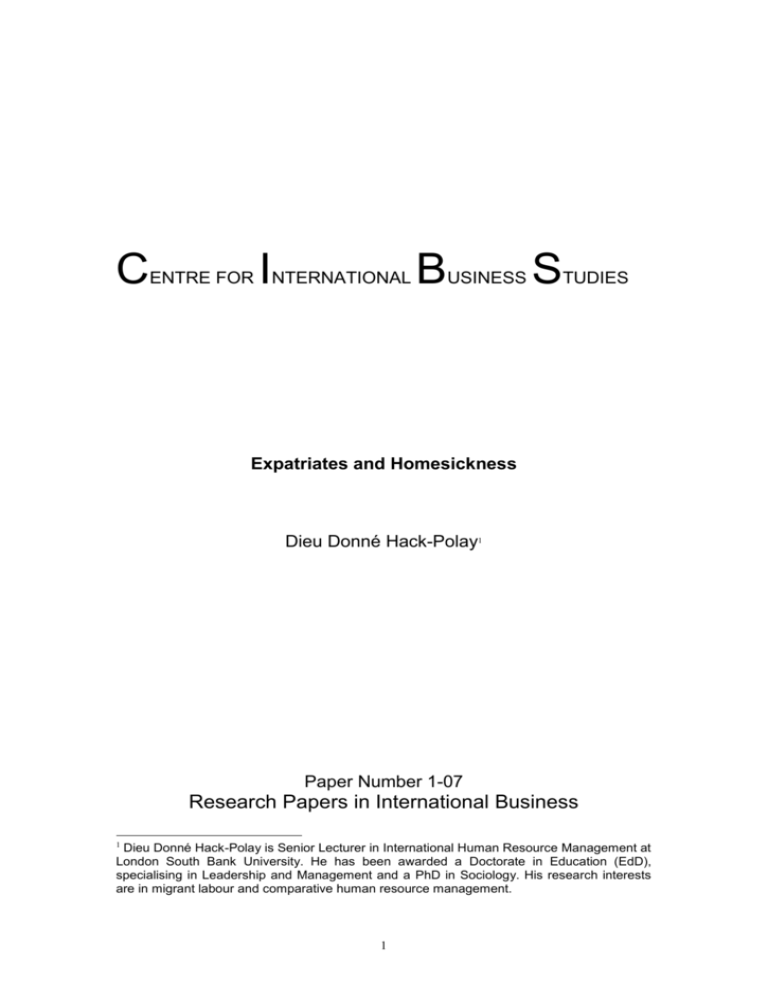
C
I
ENTRE FOR NTERNATIONAL
B
USINESS
S
TUDIES
Expatriates and Homesickness
Dieu Donné Hack-Polay1
Paper Number 1-07
Research Papers in International Business
1
Dieu Donné Hack-Polay is Senior Lecturer in International Human Resource Management at
London South Bank University. He has been awarded a Doctorate in Education (EdD),
specialising in Leadership and Management and a PhD in Sociology. His research interests
are in migrant labour and comparative human resource management.
1
Abstract
This paper addresses a forgotten issue in the area of international human
resource management, that of homesickness. The paper argues the
importance of addressing homesickness as an illness. It uses psychological
and sociological literature to highlight the negative effects of homesickness on
migrant workers and possibly on expatriates. These effects range from
psychological disruptions to physical manifestations which affect the health
and welfare of the individuals, and could ultimately impact on their
performance in the expatriate assignment. The paper concludes that given the
significant amount of evidence found to substantiate the argument that
homesickness is an illness and detrimental to psychological and social wellbeing of displaced people, it is crucial that further research is undertaken in
this area as affecting expatriates because the size of the investment in
expatriate assignment commands that the risks of failure are minimised.
Key words: homesickness, migrants, expatriates, cultural adjustment, social
isolation, performance management.
2
Introduction
Moving away from home, voluntarily as in the case of tourists, expatriates and
students, or forcibly as in the case of forced migrants and refugees has
always led people to feel homesick. Homesickness as a psychological state
created by the prospect or the reality of social isolation has been underresearched. Much of the literature on international human resource
management acknowledges that one of the key issues facing expatriates and
international staff is related to adjustment to the new place. For instance
Black, Mendenhall & Oddou (1991) identify a typology of adjustment
difficulties formed of four major elements: individual factors, non-work factors,
organisational factors and job factors. However, while issues of culture and
the family occupy a central place, homesickness is not mentioned. Similarly,
homesickness is absent from Hechanova et al.’s (2003) model of expatriate
adjustment and Briscoe & Schuler’s (2004) influential text in the field, does not
address the issue.
The present article argues that homesickness, often neglected in the
expatriate literature, is a serious issue that needs addressing. The article uses
psychological and medical reasoning to argue this seriousness. It also draws
on the literature on migrants and migrant labour to argue the far reaching
consequences of the failure to tackle the problem. The first part of the article
provides a definition of the term homesickness, which informs the rest of the
paper; the second part considers how homesickness represents an illness
and explores its consequences for expatriates, migrants and organisations;
the third part examines some theoretical models of homesickness and the
final part is concerned with the examination of some possible interventions
that multinational companies (MNCs) could consider.
Defining homesickness
Van Tilburg, Vingerhoets & Van Heck (1996: 899) define homesickness as
“the commonly experienced state of distress among those who have left their
3
house and home and find themselves in a new and unfamiliar environment”.
The authors argue that homesickness is a big stressor which can cause illhealth in the people affected, e.g. “depression, deficiencies in the immune
system, diabetes”. The authors’ claim is not isolated. Other scientists such as
Leff et al. (1970), Weissman & Paykel (1973) and Ekblad (1993) have also
found evidence to support the claim that homesickness affects health. If
homesickness affects people on the move, even the voluntary migrants, then
there is a possibility that it could also be pronounced in the expatriate
population. Indeed, the literature suggests that it is common in displaced
people and that it is an illness of socially disorientated and isolated people.
Homesickness as an illness
As
an
illness,
according
to
medical
and
psychological
evidence,
homesickness has some tangible symptoms which are physical, cognitive and
behavioural. It is not rare to see sufferers complain of gastric and intestinal
pains, lack of sleep, headache, feeling of tiredness and some eating
disorders.
Fisher (1989), Baier & Welch (1992) and many others have found
much evidence to support this claim. Examining the cognitive symptoms of
homesickness, Fisher (1989:) reveals that there develops in the displaced
person obsessive thoughts about home and sometimes simultaneously
negative thoughts about the new place. Fisher also identifies a state of absent
mindedness in the people affected. There is a tendency to idealise home
rather than revisiting the problems one encountered there before (Van Tilburg,
Vingerhoets & Van Heck, 1996: 903). The behavioural symptoms include
“apathy, listlessness, lack of initiative and little interest in the new
environment”. A number of expatriate and migrant studies acknowledged that
there are numerous and complex relationships between socio-cultural and
psychological adjustment (Scullion & Linehan, 2005; Brewster & Scullion,
1997; Fisher, 1989; Lin 1986). The business consequences of such
psychological, physiological and social anomalies are numerous and include
lack of motivation, lack of team spirit and poor performance (Deresky, 2006).
4
Omi and Winnant (2003) found similar consequences in their study of a
migrant population in East Kentucky, in the United States. It should, however,
be acknowledged that there may be elements related to personality as well as
to the impact of the micro-environment in which the expatriates or other labour
migrants arrive. If the individuals’ degree of psychological damage, as a result
of displacement, is high and has deeply affected their morale and perhaps
personality, then they are more likely to display much of the pathological signs
explained by Fisher and other psychologists. In addition, the degree to which
the new environment in which the international assignee or the migrant lands
is supportive will determine the degree to which the newcomer experiences
difficulties and the extent to which he or she feels homesick. Although most
studies of homesickness have been conducted on other groups of migrants,
not necessarily expatriates, given the above arguments it may not be
unreasonable to attempt to speculate possible generalisations of the
conclusions to international assignees and to the social environments in which
they arrive. The cognitive and behavioural symptoms of homesickness are
likely to lead to emotional problems such as low mood, lack of security,
loneliness, nervousness, lack of control and depression.
The numerous symptoms and effects of homesickness help to
appreciate the seriousness of the problem, especially as it may affect long
term international assignees and expatriates. Many expatriates, in fact, are
people who may already be facing stress associated with their involvement in
major ventures in the home country; in addition they may be facing the
dilemma of whether to pursue their career within a MNC in their own home
country or seek an international experience often seen as a ‘fetishism’ for a
high flying career as a global manager or consultant. Further dilemma would
be faced by dual career couples that may be worried about opportunities for
the partner abroad or the security of their jobs on return. Such a
‘psychological trauma’ coupled with isolation and difficult conditions in the new
environment could culminate into acute cases of homesickness. If support is
not offered, then homesickness may contribute to protract their suffering. In
such a case, integration and successful rebuilding of broken lives are in great
jeopardy and could in turn affect the success of the international assignment
as argued earlier.
5
Homesickness is often viewed as a periodic situation although in
“severe cases these feelings are continuous” (Fisher et al., 1984). These
severe cases may apply to international assignees as they would have often
left societies with largely different cultures. The seriousness of homesickness
is further indicated by its prevalence although it has been suggested that it is
hard to assess prevalence of the ‘disease’ because of its periodicalness. Van
Tilburg, Vingerhoets & Van Heck (1996) have found that most people
experience homesickness especially in the early days of their departure and
only grave experiences are reported spontaneously. Fisher et al., (1984)
studied homesickness among boarding school pupils and they found that only
18 per cent of cases were reported. However, a deeper investigation in the
same school revealed that there was a prevalence rate of 60 to 70 per cent.
This situation may translate the case of expatriates who fall within a field that
is under-researched as asserted and substantiated earlier in this paper. The
little attention paid to homesickness in expatriate literature and, at the same
time, the volumes of existing evidence that a significant number of
international assignments end in failure (Briscoe & Schuler, 2004), could be
an indication that many cases of homesickness go unreported. Homesickness
in expatriates and international workers could be a deeper and continuous
process that should command more attention if the success rate in
international labour transfers is to improve.
Theoretical models of homesickness
Fisher (1989) developed models of homesickness that, in many ways,
resemble Lin’s (1986) model of psychological and social disruption in forced
migrants. Fisher drew five models to the ways in which homesickness affect
people who are away from their usual ‘home’. The first, the Loss and
attachment model, assumes that the separation of the person from his or her
social and cultural networks is felt as a loss which sometimes turns into
anxiety, grief and anger. If this is persistent, the feeling of loss aggravates to
become apathy and helplessness (Van Tilburg, Vingerhoets & Van Heck,
1996: 903). These latter consequences of homesickness in the loss model are
what occasion a situation of dependency for the people affected and leads, in
6
turn, to “depression, orgoraphobia, two symptoms of home sickness”
according to the authors.
The second model, the Interruption and discontinuity model, is based
on the fact that a break in the way people used to lead their lives and fulfil
their daily routines can be an important stressor and the source of other
negative emotions like fear, anxiety, and distress. The individual becomes
powerless because the basic foundations of his/her real life have broken
down. In order to survive in the new environment, the expatriate or displaced
person needs important adjustments that may not be achieved in the
immediate future, or may not be achievable at all. Thus, the more protracted
the process of adjustment is, the more anxiety, fear and depression is
developed which could prevent, to a large extent, successful social and
professional integration in the case of international assignees.
In a third model, the Reduced personal control model, Fisher (1989)
argues that the displaced person is not in control of the new environment in
which he or she has landed. In many instances, the individual lacks coping
mechanisms susceptible of helping to accommodate the new social, cultural,
technological and psychological conditions which can be perceived as
opposing and threatening forces. These observations have led Burt (1993) to
argue that the development of homesickness is mainly due to the fact that the
displaced person is not in control of the host environment.
In Fischer’s fourth model, the Change and transition model, individuals
are obliged to accept to fulfil new roles that are supposed to enable them to
live in harmony with the host environment. The transition between “giving up”
old roles and habits to “adopt” the novel ones is particularly stressful. This has
been observed in male and female migrant behaviour. For instance, in
research by the various migrant assisting organisations, some male migrants
have been reluctant to perform kitchen and childcare duties in the United
Kingdom because in their original cultures such duties are essential feminine
Similarly, some female migrants have been reluctant to contemplate work with
male colleagues as this might clash with their own culture and religion. (HackPolay, 2006).
In his final model, the Conflict model, Fisher’s (1989) believes that
there is a perceived or potential conflict within the individual’s self. On the one
7
hand the displaced person has the will - or is rather forced - to learn and
acquire new ways of seeing and approaching things and life. On the other
hand, there is a sort of resistance on the part of the individual to
accommodate the irreversible and uncontrollable wind of change. Thus, there
exists in the mind of the displaced persons a desire (or rather hope) to return
home but they are confronted with issues of security and safety.
These models are interesting to consider in the attempt to understand
the behaviours of displaced people including expatriates and international
workers. The models offer a fairly comprehensive catalogue of what
expatriates may feel like and do in the new socio-cultural and professional
context. However, instead of seeing Fisher’s theories as five different models,
there could be a realistic inclination to categorise them as one single model of
homesickness with different stages. Indeed, it is not rare to observe that an
individual goes through more than one, and sometimes, all the stages defined
by Fisher’s model. These stages may be experienced or felt simultaneously or
occur gradually. A few theorists suggest some possible interventions or
remedy to cure the homesickness illness.
Possible interventions
Curative intervention
Van Tilburg, Vingerhoets & Van Heck, (1996: 909) have argued that “the
possibilities of interventions appear to be limited”. But much of what the
literature suggests as a remedy for the ‘common illness’ of homesickness
turns around the return to the original society. This mode of intervention can
be seen as controversial because in many cases the people affected cannot
return, at least not immediately, to the original society because of coercive
forces preventing them to do so. In the case of expatriates, for instance, the
coercive force may be the risk of losing their jobs, shame of being labelled as
incompetent, the risk of not being able to move up the ladders in their career,
or the prospect of unemployment, etc.
Probably, other more realistic modes of interventions may be found in
the “stress management” approach (Fisher, 1989). It is designed to help the
8
affected people to accept the feeling of homesickness, to be involved in the
new environment, to do physical activities (sports, games, visits), to eat and
sleep well, to go onto training programmes (Van Tilburg, Vingerhoets & Van
Heck, 1996). It can be seen that, with the exception of the stress management
approach, most remedies are social interventions and they turn around
reconstructing the social context or what is regarded as home. However, in
order to be effective, the artificial home needs much resemblance to the
original one and this should be reflected in the resettlement strategies and the
choice of resettlement areas for refugees. The reconstruction of a familiar
social context needs to take account of culture because this has often
represented another big problem for displaced people and is well documented
in expatriate literature.
Preventive solutions
Preventive solutions may be deeply rooted in the ability of the organisations to
ensure adequate preparations for their expatriates before departure. Deresky
(2006) emphasise the crucial importance of preparation and training. She
argues that such activities smooth the expatriate’s landing in the new
environment and reduce the culture shock, including disorientation and
anxiety. Deresky also argues that people in such a situation face trauma and
key symptoms of this include irritation and deep seated-psychological panic
and crisis.
Preparation should chiefly be concerned with informing the expatriate
about the circumstances in the host country; it should also crucially highlight
the possibility that the expatriate may suffer some social and psychological
isolation for some time before he or she becomes acquainted with the new
environment, i.e. both physical and social. There should be an understanding
that this process is normal and requires time and personal or family effort for a
positive and gradual adjustment. Deresky (2006: 364) believes that important
family problems could result from homesickness; members could turn against
each other and this could lead, on occasions, to the disintegration of the
family. The author argues that a large number of people do not pass this
stage, causing the expatriate to return earlier.
9
As part of the preventive methods, the expatriates pack should include
plans for frequent return visits back home. Although this may add to the
overall cost of the expatriate assignment, it will still remain cheaper than failed
expatriation. This should be accounted for as part of the balance sheet
approach to compensating the expatriate as it will equalise the standard of
living between the host and home countries and compensate for
inconvenience or qualitative loss (Deresky, 2006: 370). Possibly, a relative of
the expatriate, apart from the accompanying spouse and children, could be
sponsored by the organisation to visit the expatriate occasionally. This may be
the mother, father or other relative dear to the expatriate. This approach is
likely to ensure that there is not substantial breakdown in the family
relationship and reduce the feeling of missing dear ones, which is often at the
centre of homesickness. Such a strategy could be vital where the member of
staff is located in a very remote area difficult to access and where the
expatriate has little available option even if he or she wanted to fund their own
outward visits.
Last but not least, reducing homesickness could also take into account
an attempt to rebuild a socio-cultural network, however artificial it may be. In
many places several multinational companies work in juxtaposition and their
staff may share cultural norms. For instance, areas such as Thailand,
Indonesia or West Africa where French, British and American expatriates
work for their respective MNCs, there could be concerted efforts to set an
expatriate network that could also include host country nationals (HCNs).
Cultural practices such as nightclubs, religious institutions (church, mosque)
schools or childcare facilities could be set up jointly to provide a more cultural
sensitive network for the expatriates. This is far from implying that parent
company nationals (PCNs) and third country nationals (TCNs) should cut
themselves off the host society. On the contrary they learn from each other’s
adjustment difficulties and successes at the same time as combating
somehow the effects of home sickness. In a study on forced migrants
Reynolds & Shackman (1995) argued that possibly the best way to help the
migrants to settle in the new society is to help them build familiar social
networks and self-help groups that would provide them with the means to
integrate the wider host society.
10
Conclusion
The paper has shown that homesickness is a critical issue for migrants and
other displaced people. This could affect expatriates and multinational
organisations to a large extent. Not many studies have been conducted
specifically with regards to expatriates but some of the little evidence we have
(Deresky, 2006) suggests that it is a serious issue with potentially serious
negative impacts if it is not remedied. In fact homesickness is a condition that
many psychologists see as an illness (Fisher, 1989; Van Tilburg, Vingerhoets
& Van Heck, 1996), with important manifestations that have bearings on
performance. For example, the displaced person could be irritable, sad,
uncooperative and lacking initiative and drive. These elements seen in a
business context may lead to lower performance and productivity. Harris,
Brewster & Sparrow, 2004 argue that performance management should be a
crucial area for investigation, and I believe that in undertaking this task, the
impact of homesickness on expatriate performance should not be overlooked.
Further research needed to establish the weight of homesickness in
expatriate failure. This means attempting to establish whether an employee
posted overseas who is free from homesickness as an illness will have better
performance and generate better return on investment and, if so, how to set
the labour migrant free from homesickness. For homesickness could be a
critical factor affecting adaptation and adjustment and should require greater
attention than it receives at present. Expatriation is a tremendous corporate
investment whose high cost has been consistently argued and it is important
to take every little step to safeguard such crucial investment.
References
Baier, M & Welch, M (1992), “An analysis of the concept of homesickness”
Archives of Psychiatric Nursing, 6, 54-60.
11
Black, J S, Mendenhall, M & Oddou, G (1991), “Towards a comprehensive
model of international adjustment: an integration of multiple theoretical
perspectives”, Academy of Management Review, 16, 291-317.
Brewster, C & Scullion, H (1997), “Expatriate HRM: an agenda and a review”,
Human Resource Management Journal, 7 (3), 32-41.
Briscoe, R S & Schuler, D R (2004), International human resource
management, New York: Routledge.
Burt, C. D. B. (1993), "Concentration and academic ability following transition
to university: an investigation of the effects of homesickness" Journal of
Environmental Psychology, 13, 333-342.
Deresky (2006), International management: managing across borders and
cultures, New Jersey: Pearson/Prentice Hall.
Ekblad, S (1993), “Psychological adaptation of children while housed in
Swedish refugee camp: aftermath of the collapse of Yugoslavia”, Stress
Medicine, 9, 159-166
Fisher, S., (1989), Homesickness, cognition and health, London: Erlbaum.
Fisher, S & al. (1984), “The transition from home to boarding school: a diarystyle analysis of the problems and worries of boarding school pupils”, Journal
of Environmental Psychology, 6, 35-37.
Hack-Polay, D D (2006), Metaphors and narratives in exile: understanding the
experiences of forced migrants in Britain, [unpublished PhD thesis], Guildford,
University of Surrey.
Harris, H, Brewster, C & Sparrow, P (2004), International human resource
management, London: CIPD.
12
Hechanova,
R,
Beehr,
T
A
&
Christiansen,
N
D
(2003),
”Antecedents and consequences of employees' adjustment to overseas
assignment: a meta-analytic review”, Applied Psychology, 52 (2), 213–236.
Leff, M J et al. (1970), “Environmental factors preceding the onset of severe
depressions”, Psychiatry, 33, 293-311.
Lin, K M (1986) “Psychopathology disruption in refugees” in Williams, C L &
Westermeyer, J (eds.), Refugee mental health in resettlement countries,
Washington DC: Hemisphere Publishing Corporation, 61-73.
Omi, M & Winnant, H (2003), Racial formation in the United States, London:
Routledge.
Scullion, H & Linehan, M (2005), International human resource management:
a critical text, Basingstoke: Palgrave Macmillan.
Shackman, J & Reynolds, J (1995), On defeating exile, London: OpenMind.
Van Tilburg, M A L, Vingerhoets, A J & Van Heck, G L (1996),
“Homesickness: a review of the literature”, Psychological Medicine, 26, 899912.
Weissman, M M & Paykel, E S (1973), Moving and depression in women,
New York: Basic Books.
13
14



